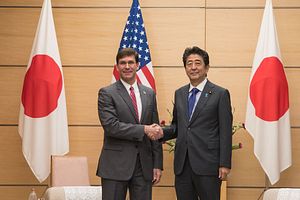Last week, U.S. Defense Secretary Mark Esper traveled to Tokyo and Seoul to reiterate the importance of the United States’ Asian alliances.
On August 7, Esper met with Japanese Defense Minister Takeshi Iwaya and they agreed that continued U.S.-Japan cooperation as well as cooperation with South Korea is critical to deal with North Korea’s nuclear weapons and ballistic missiles. One of the concrete issues that Esper and Iwaya agreed on was the need to maintain the Japan-South Korea General Security of Military Intelligence Agreement (GSOMIA).
Two days later, in Seoul, Esper and South Korean President Moon Jae-in also agreed on the importance of trilateral cooperation. It is believed that Esper asked Moon to extend GSOMIA amid speculation that South Korea might scrap the intelligence-sharing agreement in retaliation for Tokyo’s tighter export controls.
GSOMIA, signed in November 2016, is an important foundation on which to build bilateral and trilateral cooperation. Even without GSOMIA, Japan and South Korea can share information via the United States through a trilateral military intelligence agreement. But the trilateral agreement is limited to North Korea’s nuclear and missile program. GSOMIA allows Japan and South Korea to directly share a broader range of information. While the agreement is extended annually automatically, either side can abrogate it by notifying the other party 90 days prior to automatic renewal. That deadline falls on August 24.
Unfortunately, this is not the first time GSOMIA has got caught in the crosshairs of domestic politics. In June 2012, the South Korean side backed out of signing it at the last-minute due to domestic public backlash. The South Korea public is generally averse to any military agreement with Japan – its former colonizer – and the secretive way in which former President Lee Myung-bak conducted negotiations did not help. The deal was eventually signed in 2016 by Lee’s successor, Park Geun-hye, despite strong protests from the opposition – including current President Moon’s Democratic Party. Now GSOMIA is once again under threat, thanks to renewed tensions between Tokyo and Seoul.
What started as a dispute over the compensation of Korean forced laborers escalated into a trade issue, with South Korea removing Japan from its list of nations receiving preferential treatment in trade. Now the spat is having negative spillover effects on the security aspect of the bilateral relationship. Earlier on Friday in a meeting with Esper, South Korean Defense Minister Jeong Kyeong-doo claimed that Japan’s stricter export controls were harming bilateral relations and security cooperation between Tokyo, Washington, and Seoul. According to Japan Times, a Japanese Ministry of Defense source reported that Japan will downgrade South Korea’s relative status as a Japanese security partner in the upcoming 2019 Defense White Paper (expected to be published in mid-September).
On the same day as the meeting with Esper, the Japanese government removed South Korea from its “white list” of nations given preferential trade status. This restriction will go into effect on August 28. But the very next day, on August 8, the Japanese government issued a permit approving the export to South Korea of one of the three products used in semiconductor production that were subjected to tighter controls on July 4. High-level government officials including Chief Cabinet Secretary Yoshihide Suga and Economy, Trade, and Industry Minister Hiroshige Seko have been pushing the narrative that Japan is applying these trade restrictions fairly. Japan’s argument is that if concerns about the exports being used for military purposes or diverted to third party countries are addressed, then Japan is still, in principle, willing to export to South Korea.
It is unclear what role, if any, the United States can play in all of this. U.S. security interests are harmed by the dispute, but the proverbial ship has already sailed for the United States to play a proactive de-escalatory role. With both sides publicly committed to their positions, Washington cannot intervene without being accused of favoritism by the side that feels short-changed – which could, given the lose-lose situation, be both allies. This is an issue that Japan and South Korea have to settle.
Furthermore, it is unclear what leverage the United States still has in the region. U.S. President Donald Trump’s rhetoric has consequences for how states in the region see what Washington’s role ought to be. The United States cannot try to shirk its responsibilities in the Asia-Pacific, blithely cozy up to the dictator of an adversarial, threatening regime, and expect to still be respected as a credible mediator. The Japan-South Korea dispute, with all its consequences for bilateral and trilateral security cooperation in the region, is not in U.S. interests. But the United States ceded the moral high ground from which to admonish other states’ behavior with the advent of Trump’s transactional and illiberal foreign policy.
As we approach August 15, the anniversary of Japan’s surrender in World War II, tensions in the region remain high. Whether Moon repeats the kind of fire-breathing rhetoric at the emergency cabinet meeting on August 2 – “We will never again lose to Japan” – or the more conciliatory tone he struck more recently – “While maintaining unwavering resolve and calmness, we need a long-term approach to look for fundamental countermeasures” – will be a key indicator of how the South Korean government plans on proceeding as we head towards both the August 24 deadline for GSOMIA withdrawal and the August 28 imposition of increased export controls.

































